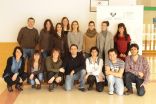(Press-News.org) This news release is available in German.
How do we as individuals prompt our fellow humans to behave socially? This is one of the central questions relating to social dilemmas in game theory. Previous studies assumed that it is almost impossible to control cooperation in large groups. Nonetheless, scientists from the Max Planck Institute for Evolutionary Biology have now demonstrated that each of us can exert an influence on the cooperative behaviour of others. However, the possibilities available to the individual are limited in this regard, particularly in the context of large groups. The researchers therefore also examined how group success is influenced when several like-minded members join forces. The mathematically calculated result corroborates experience: we can achieve more when we act together.
When game theorists test cooperative behaviour, they often use the prisoner's dilemma as a model, whereby two players decide separately to act either socially or egoistically. If both act egoistically, they derive little benefit. The greatest benefit is obtained by the person who acts egoistically while his (or her) counterpart acts socially. When this situation is iterated several times in succession with both participants, cooperation may arise.
Based on this dilemma, for a long time, game theory considered it impossible for one player to control the outcome irrespective of the approach adopted by the other. But two years ago an American research team demonstrated mathematically that, based on zero-determinant (ZD) strategies, it is actually possible for an individual player to enforce a correlation between own payoff and that of the opponent. Thus, a player can determine whether he or she will benefit to the same or even greater extent as the other by playing generously, fairly or extortionately. In particular, the possibility of extortion was previously unknown and its discovery caused quite a stir among experts.
In practice, however, as scientists working with Manfred Milinski from the Max Planck Institute for Evolutionary Biology in Plön discovered based on an experiment involving test subjects, many people do not allow themselves to be exploited in the long term. (See "Extortioners are only temporarily successful"). Working in cooperation with researchers from Harvard University, two of their colleagues from Plön have now tested this approach in a different way. They extended the ZD strategies mathematically to situations involving multiple players; after all, in real life, cooperation usually involves more than two participants. "Using game theory, pressing problems of our time, such as the avoidance of climate change, can be understood as social dilemmas involving multiple players," explains Arne Traulsen, Director of the Department for Evolutionary Theory at the Plön-based Max Planck Institute. "Many people have the feeling that they cannot achieve anything as individuals. However, they underestimate the possibilities available to them."
With the help of mathematical calculations, Christian Hilbe, a former post-doc in Plön, and his colleagues showed that the ZD strategies that are successful in games involving two participants are also effective in situations involving any number of players.
Therefore, an individual can also control within a group how he or she will gain from a situation compared to the other players. If the person plays fairly, i.e. cooperates if the others cooperate but punishes egoistic behaviour proportionally through a refusal to cooperate, his or her payoff will reflect the mean value of that of the other players. If a player behaves generously, that is acts socially more often than the other players, the player can ensure that these players obtain a better result. One player also has the possibility of extorting the others, however. The tactic adopted in this case is that he or she cooperates sufficiently often for it to be beneficial for the other players to adopt a cooperative strategy in the long term. At the same time, however, the extortioner aims to act egoistically more often than the others. In this way, the extortioner succeeds in exploiting the others and obtaining greater benefit.
"What interested us most, however, was how the individual can contribute to the development of stable cooperation within the group," says Hilbe. The researchers were actually able to calculate mathematically which strategies promote cooperation. According to their findings, individual players should act generously in principle to avoid ending up in a spiral of refusal when another has acted egoistically once – possibly due to a misunderstanding. On the other hand, individual players should not be too generous either and should consistently punish egoistic behaviour.
However, the strategic opportunities available to the individual always decline the more people there are involved in the game. Hence, to ensure the success of a joint strategy in large groups, it makes sense to form an alliance. According to the calculations, whether or not this tactic must be re-negotiated for each individual round or is agreed from the outset is of secondary importance. What is crucial to the shared objective is how many players join forces.
But an alliance does not necessarily have to commit itself to a social approach. On the contrary, it can form an extortioner group. "There are no limits to extortion when sufficient numbers cooperate," notes Traulsen, explaining the result of the model. Yet even this phenomenon can have a positive effect, as this group prompts the others to behave socially. As a result – according to the model – it can generate a positive group dynamic among the outsiders and promote cooperation to some extent.
INFORMATION:
Original publication:
Christian Hilbe, Bin Wu, Arne Traulsen & Martin A. Nowak
Cooperation and control in multiplasyer social dilemmas
PNAS online, 27 October 2014
Together we are strong -- or insufferable
Everyone can have an impact on the dynamics of a group, particularly if they join forces with others
2014-10-30
ELSE PRESS RELEASES FROM THIS DATE:
Lung cancer patients with MIA have comparable 97.7 percent 5-year survival as patients with AIS
2014-10-30
Chicago, October 30, 2014—Lung cancer patients with minimally invasive adenocarcinoma (MIA) have similar, positive five-year disease-free survival (DFS) and overall survival (OS) rates as patients with adenocarcinoma in-situ (AIS), according to research presented today at the 2014 Chicago Multidisciplinary Symposium in Thoracic Oncology. The Symposium is sponsored by the American Society of Clinical Oncology (ASCO), the American Society for Radiation Oncology (ASTRO), the International Association for the Study of Lung Cancer (IASLC) and The University of Chicago ...
Researchers find bat influenza viruses unlikely threaten human health
2014-10-30
MANHATTAN, Kansas — Bats seen at Halloween this year may not be quite as scary as they appear – at least when it comes to the spread of specific viruses. A research project conducted in part by a team of researchers in the College of Veterinary Medicine at Kansas State University suggests that influenza viruses carried by bats pose a low risk to humans.
"Bats are natural reservoirs of some of the most deadly zoonotic viruses, including rabies virus, Ebola virus, Henipaviruses and SARS coronavirus," said Wenjun Ma, one of the lead investigators and an assistant ...
Pterostilbene, a molecule similar to resveratrol, as a potential treatment for obesity
2014-10-30
This news release is available in Spanish.
Obesity is a chronic disease caused by a whole range of factors and defined as an excessive accumulation of body fat. It is a metabolic disease very prevalent in developed countries and a significant risk factor for developing certain pathologies and alterations like insulin resistance, diabetes, fatty liver, alterations in plasma lipids and hypertension, among others.
The traditional guidelines for preventing and treating obesity include following a low-calorie diet and doing moderate physical activity over the long ...
Can parents make their kids smarter?
2014-10-30
TALLAHASSEE, Fla. — Reading bedtime stories, engaging in conversation and eating nightly dinners together are all positive ways in which parents interact with their children, but according to new research, none of these actions have any detectable influence on children's intelligence later in life.
Florida State University criminology professor Kevin Beaver examined a nationally representative sample of youth alongside a sample of adopted children from the National Longitudinal Study of Adolescent Health (Add Health) and found evidence to support the argument that ...
New guidelines for reproductive & developmental toxicity testing of oligonucleotide drugs
2014-10-30
New Rochelle, NY, October 30, 2014—Oligonucleotide-based therapeutics present unique challenges when it comes to testing their potential to cause reproductive and developmental harm. New consensus guidelines for toxicity testing that take into consideration the combined chemical and biological characteristics of these novel biopharmaceuticals are presented in Nucleic Acid Therapeutics, a peer-reviewed journal from Mary Ann Liebert, Inc. publishers. The article is available free on the Nucleic Acid Therapeutics website until November 30, 2014.
Joy Cavagnaro, Access ...
Breakdown in gut barriers to bacteria may promote inflammation and craving in alcoholics
2014-10-30
Philadelphia, PA, October 30, 2014 – Bacteria in the gastrointestinal tract fulfill many vital functions and are critical for digestion. Yet, these same bacteria can induce strong inflammatory responses by the immune system if they penetrate the gut and enter the bloodstream.
Although acute inflammation is a natural response to protect the body, chronic or systemic inflammation is linked to numerous disorders and diseases. Prior research has established the involvement of inflammatory processes in the development of psychiatric disorders, including major depression ...
Sadness lasts longer than other emotions
2014-10-30
New York | Heidelberg, 30 October 2014 Why is it that you can feel sad up to 240 times longer than you do feeling ashamed, surprised, irritated or even bored? It's because sadness often goes hand in hand with events of greater impact such as death or accidents. You need more time to mull over and cope with what happened to fully comprehend it, say Philippe Verduyn and Saskia Lavrijsen of the University of Leuven in Belgium. Their research, published in Springer's journal Motivation and Emotion, is the first to provide clear evidence to explain why some emotions last a longer ...
Campaign to reduce firearm suicide wins support among firearm retailers in New Hampshire
2014-10-30
Boston, MA — Nearly half (48%) of firearm retailers in New Hampshire displayed materials from a firearm suicide prevention campaign generated by a coalition of gun owners and public health professionals, according to a new study led by Harvard School of Public Health (HSPH) researchers. It is the first collaboration between firearm retailers and public health professionals around suicide prevention.
The study appeared online October 28, 2014 in Suicide and Life-Threatening Behavior.
Following a spate of suicides in 2009 in New Hampshire involving recently-purchased ...
Yale finds a planet that won't stick to a schedule
2014-10-30
New Haven, Conn. – For their latest discovery, Yale astronomers and the Planet Hunters program have found a low-mass, low-density planet with a punctuality problem.
The new planet, called PH3c, is located 2,300 light years from Earth and has an atmosphere loaded with hydrogen and helium. It is described in the Oct. 29 online edition of The Astrophysical Journal.
The elusive orb nearly avoided detection. This is because PH3c has a highly inconsistent orbit time around its sun, due to the gravitational influence of other planets in its system. "On Earth, these effects ...
Screening patients at high-risk for lung cancer more likely when prmary care provider is familiar with guidelines
2014-10-30
Chicago, October 30, 2014—Patients at high-risk for developing lung cancer are more likely to receive low-dose computed tomography (LDCT) screening when their primary care provider is familiar with guideline recommendations for LDCT screening for lung cancer, according to research presented today at the 2014 Chicago Multidisciplinary Symposium in Thoracic Oncology. The Symposium is sponsored by the American Society of Clinical Oncology (ASCO), the American Society for Radiation Oncology (ASTRO), the International Association for the Study of Lung Cancer (IASLC) and ...
LAST 30 PRESS RELEASES:
Differing immune responses in infants may explain increased severity of RSV over SARS-CoV-2
The invisible hand of climate change: How extreme heat dictates who is born
Surprising culprit leads to chronic rejection of transplanted lungs, hearts
Study explains how ketogenic diets prevent seizures
New approach to qualifying nuclear reactor components rolling out this year
U.S. medical care is improving, but cost and health differ depending on disease
AI challenges lithography and provides solutions
Can AI make society less selfish?
UC Irvine researchers expose critical security vulnerability in autonomous drones
Changes in smoking status and their associations with risk of Parkinson’s, death
In football players with repeated head impacts, inflammation related to brain changes
Being an early bird, getting more physical activity linked to lower risk of ALS
The Lancet: Single daily pill shows promise as replacement for complex, multi-tablet HIV treatment regimens
Single daily pill shows promise as replacement for complex, multi-tablet HIV treatment regimens
Black Americans face increasingly higher risk of gun homicide death than White Americans
Flagging claims about cancer treatment on social media as potentially false might help reduce spreading of misinformation, per online experiment with 1,051 US adults
Yawns in healthy fetuses might indicate mild distress
Conservation agriculture, including no-dig, crop-rotation and mulching methods, reduces water runoff and soil loss and boosts crop yield by as much as 122%, in Ethiopian trial
Tropical flowers are blooming weeks later than they used to through climate change
Risk of whale entanglement in fishing gear tied to size of cool-water habitat
Climate change could fragment habitat for monarch butterflies, disrupting mass migration
Neurosurgeons are really good at removing brain tumors, and they’re about to get even better
Almost 1-in-3 American adolescents has diabetes or prediabetes, with waist-to-height ratio the strongest independent predictor of prediabetes/diabetes, reveals survey of 1,998 adolescents (10-19 years
Researchers sharpen understanding of how the body responds to energy demands from exercise
New “lock-and-key” chemistry
Benzodiazepine use declines across the U.S., led by reductions in older adults
How recycled sewage could make the moon or Mars suitable for growing crops
Don’t Panic: ‘Humanity’s Last Exam’ has begun
A robust new telecom qubit in silicon
Vertebrate paleontology has a numbers problem. Computer vision can help
[Press-News.org] Together we are strong -- or insufferableEveryone can have an impact on the dynamics of a group, particularly if they join forces with others



